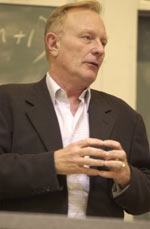A view from the trenches
In Alan Ross’ poli-sci class, students hear about political life from practitioners of the art
![]()
| 19 March 2003
| |  Republican leader Shawn Steel during his visit to Alan Ross’ class, Political Science 179. Photo reprinted by permission of The Daily Californian |
It’s a sunny, springlike afternoon, and Alan Ross’ political science class is filled with more than 400 students gathered to hear from the former chair of the California Republican Party.
Could that be right? A packed classroom of Berkeley students eagerly awaiting an address by a political conservative?
Such scenes happen regularly in P.S. 179, a.k.a. “Colloquium on Political Science,” a class where preconceptions about both students and speakers are often placed in check.
In fact, when Ross, a political science lecturer, began teaching the class more than 20 years ago, his goal was not only to bring students in direct contact with the state’s key political players, but to place before them a broad spectrum of passionate speakers.
“I want speakers to challenge the students,” says Ross, “and I want the students to challenge the speakers.”
During Republican leader Shawn Steel’s visit to the class on March 5, students listened respectfully, laughed away his sarcastic quips about Democrats, then peppered him with pointed questions about U.S. foreign policy under President Bush and the California Republican Party’s questionable success in reaching out to ethnic minority groups.
Steel loved it. “I wouldn’t miss it,” he said later. “Are you kidding?”
Ross’ little one-unit class consistently attracts a big audience — each semester there’s a waiting list of as many as 100 students trying to get into the 450-student class. And it attracts an amazingly broad array of speakers, including former U.S. Labor Secretary Robert Reich, Democratic strategist Garry South, U.S. Senator Barbara Boxer, UC Regent Ward Connerly, and actors-turned-political-activists Danny Glover and Arnold Schwarzenegger. (Sharon Stone is currently on Ross’s wish list of actor activists he’d like to visit the class.) Over the years, other speakers have included such politicians as Willie Brown, Alan Cranston, Gary Hart and George Deukmejian, as well as journalists who cover and comment on the California political scene.
Ross believes that many of the guest speakers are eager simply to be heard by Berkeley students. That was Steel’s motivation: “To go into the belly of the beast, the citadel of intolerance, and have a conversation is remarkable,” he said. “To have a dialogue and to get a positive reception, that is a plus. That means there’s hope.”
An honor to be invited
After Ward Connerly agreed to speak to the class about 10 years ago and was met with a respectful audience, the course began to attract more conservatives. Since then, the guest list has included a broad range of politicians, activists, government officials, and campaign strategists. Many consider it an honor to be invited.
“Word of mouth is phenomenal now,” says Ross. “I have people calling me asking if they can come to speak to the class.”
Ross, who worked in campaign management in the 1980s, begins with a wish list of speakers. He checks out their speaking abilities, considers whether they are in the news, then uses his contacts — or his students’ contacts from summer jobs in Sacramento and such — to book them for the class. Speakers are not paid a fee and are not compensated for travel.
Many politicians have never been invited. Ross searches not only for political players who are making a difference but for speakers who are passionate and have an opinion that does not sit squarely in the middle of the road. After hearing some individuals speak elsewhere, Ross scratches their names off his wish list.
It is his lineup of speakers that keeps students coming back. And it is not unheard of to run into students who have taken the class several times, which they can do for credit because the roster of guests continually changes.
“I really enjoy the speakers who come to class,” said Carlo Funtanilla, a senior majoring in political science who has taken the class four times. “You get to listen to a lot of speakers that you wouldn’t expect to hear. Robert Reich talked about his experience as a cabinet member. You don’t really get that from professors.”
Anka Lee, another political science major and a four-time veteran of Poli Sci 179, said the course complements other classes in that discipline. “Cal has a very strong political science department, and a lot of it is really theoretical,” he said. “It’s one thing to read about what’s going on, and it’s another to hear from a Garry South who tells you all these stories from the campaign trail. It puts a face on the political process. You can actually get a taste of it as opposed to reading about it.”

